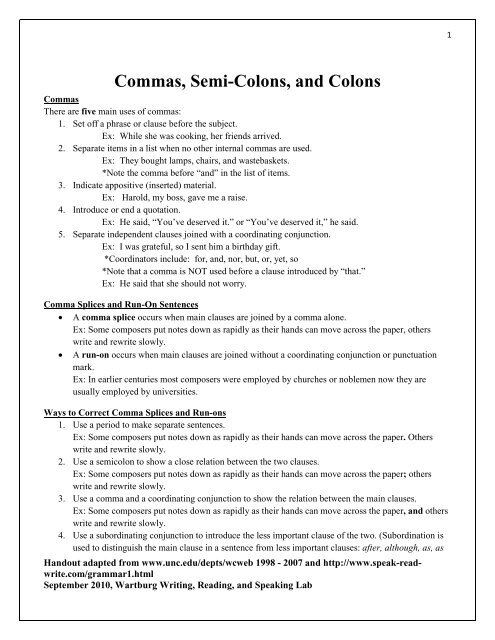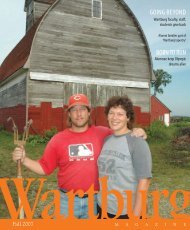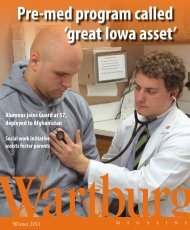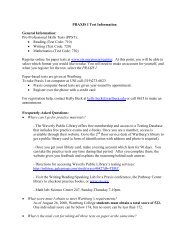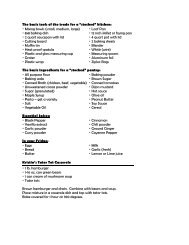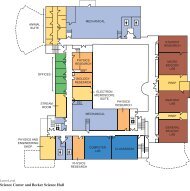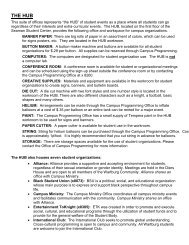You also want an ePaper? Increase the reach of your titles
YUMPU automatically turns print PDFs into web optimized ePapers that Google loves.
<strong>Commas</strong>, <strong>Semi</strong>-<strong>Colons</strong>, <strong>and</strong> <strong>Colons</strong><br />
<strong>Commas</strong><br />
There are five main uses of commas:<br />
1. Set off a phrase or clause before the subject.<br />
Ex: While she was cooking, her friends arrived.<br />
2. Separate items in a list when no other internal commas are used.<br />
Ex: They bought lamps, chairs, <strong>and</strong> wastebaskets.<br />
*Note the comma before “<strong>and</strong>” in the list of items.<br />
3. Indicate appositive (inserted) material.<br />
Ex: Harold, my boss, gave me a raise.<br />
4. Introduce or end a quotation.<br />
Ex: He said, “You’ve deserved it.” or “You’ve deserved it,” he said.<br />
5. Separate independent clauses joined with a coordinating conjunction.<br />
Ex: I was grateful, so I sent him a birthday gift.<br />
*Coordinators include: for, <strong>and</strong>, nor, but, or, yet, so<br />
*Note that a comma is NOT used before a clause introduced by “that.”<br />
Ex: He said that she should not worry.<br />
Comma Splices <strong>and</strong> Run-On Sentences<br />
• A comma splice occurs when main clauses are joined by a comma alone.<br />
Ex: Some composers put notes down as rapidly as their h<strong>and</strong>s can move across the paper, others<br />
write <strong>and</strong> rewrite slowly.<br />
• A run-on occurs when main clauses are joined without a coordinating conjunction or punctuation<br />
mark.<br />
Ex: In earlier centuries most composers were employed by churches or noblemen now they are<br />
usually employed by universities.<br />
Ways to Correct Comma Splices <strong>and</strong> Run-ons<br />
1. Use a period to make separate sentences.<br />
Ex: Some composers put notes down as rapidly as their h<strong>and</strong>s can move across the paper. Others<br />
write <strong>and</strong> rewrite slowly.<br />
2. Use a semicolon to show a close relation between the two clauses.<br />
Ex: Some composers put notes down as rapidly as their h<strong>and</strong>s can move across the paper; others<br />
write <strong>and</strong> rewrite slowly.<br />
3. Use a comma <strong>and</strong> a coordinating conjunction to show the relation between the main clauses.<br />
Ex: Some composers put notes down as rapidly as their h<strong>and</strong>s can move across the paper, <strong>and</strong> others<br />
write <strong>and</strong> rewrite slowly.<br />
4. Use a subordinating conjunction to introduce the less important clause of the two. (Subordination is<br />
used to distinguish the main clause in a sentence from less important clauses: after, although, as, as<br />
H<strong>and</strong>out adapted from www.unc.edu/depts/wcweb 1998 - 2007 <strong>and</strong> http://www.speak-readwrite.com/grammar1.html<br />
September 2010, Wartburg Writing, Reading, <strong>and</strong> Speaking Lab<br />
1
if, because, in order that, since, so that, than, that, unless, until, when, whenever, where, wherever,<br />
whether, while, etc.)<br />
Ex: Although some composers put notes down as rapidly as their h<strong>and</strong>s can move across the paper,<br />
others write <strong>and</strong> rewrite slowly.<br />
Unnecessary Comma Usage<br />
1. Do not use a comma between a subject <strong>and</strong> a verb.<br />
Ex: (Incorrect) First contact between human kind <strong>and</strong> celestial aliens, is the subject of many sciencefiction<br />
works.<br />
Ex: (Correct) First contact between human kind <strong>and</strong> celestial aliens is the subject of many sciencefiction<br />
works.<br />
2. Do not use a comma between a preposition <strong>and</strong> its object.<br />
Ex: (Incorrect) Comets were once thought to be fiery messages from, angry gods.<br />
Ex: (Correct) Comets were once thought to be fiery messages from angry gods.<br />
3. Do not use commas to separate restrictive elements from the rest of the sentence.<br />
Ex: (Incorrect) The belief, that comets are the fiery messages of the gods, is an ancient one.<br />
Ex: (Correct) The belief that comets are the fiery messages of the gods is an ancient one.<br />
4. Do not use a comma after such as <strong>and</strong> like.<br />
Ex: (Incorrect) Some writers, such as, Hemingway <strong>and</strong> Faulkner, influenced contemporary American<br />
writers.<br />
Ex. (Correct) Some writers such as Hemingway <strong>and</strong> Faulkner, influenced contemporary American<br />
writers.<br />
5. Do not use a comma before the first or after the last item in a series unless a rule requires it.<br />
Ex: (Incorrect) Reading, writing, <strong>and</strong> arithmetic, should be the spine of education.<br />
Ex: (Correct) Reading, writing, <strong>and</strong> arithmetic should be the spine of education.<br />
6. Do not use a comma before the word than in a comparison.<br />
Ex: (Incorrect) Hang gliding is more exciting, than skydiving.<br />
Ex: (Correct) Hang gliding is more exciting than skydiving.<br />
<strong>Semi</strong> <strong>Colons</strong><br />
<strong>Semi</strong> colons separate two main clauses that are closely related but could st<strong>and</strong> on their own.<br />
They can add variety to paragraphs with many short sentences.<br />
Ex: He decided that his calling in life would be to write for ESPN Magazine; he changed his<br />
major from dance performance that afternoon.<br />
<strong>Semi</strong> colons can also be used in lists where a comma will not sufficiently separate the items.<br />
Ex: Students came from Rochester, Minnesota; Milwaukee, Wisconsin; Aurora, Illinois; <strong>and</strong><br />
Mason City, Iowa.<br />
*Because the items in the list already have commas, semi colons are necessary.<br />
H<strong>and</strong>out adapted from www.unc.edu/depts/wcweb 1998 - 2007 <strong>and</strong> http://www.speak-readwrite.com/grammar1.html<br />
September 2010, Wartburg Writing, Reading, <strong>and</strong> Speaking Lab<br />
2
<strong>Colons</strong><br />
<strong>Semi</strong> colons can be used to add <strong>and</strong>/or separate information to a complete sentence.<br />
Ex: She knew exactly what she wanted: banana cream pie.<br />
*If the sentence is not complete, this can frequently be fixed by adding “the following” before the colon.<br />
Ex: His grocery list included: rice, beans, <strong>and</strong> cookies. (INCORRECT)<br />
His grocery list included the following: rice, beans, <strong>and</strong> cookies. (CORRECT)<br />
*If you aren’t sure if a colon is appropriate, see if you could replace it with “namely.” If the sentence would<br />
be correct with “namely,” it’s probably correct with a colon.<br />
Ex: She knew exactly what she wanted, namely, banana cream pie. (CORRECT)<br />
She knew exactly what she wanted: banana cream pie. (ALSO CORRECT)<br />
H<strong>and</strong>out adapted from www.unc.edu/depts/wcweb 1998 - 2007 <strong>and</strong> http://www.speak-readwrite.com/grammar1.html<br />
September 2010, Wartburg Writing, Reading, <strong>and</strong> Speaking Lab<br />
3


